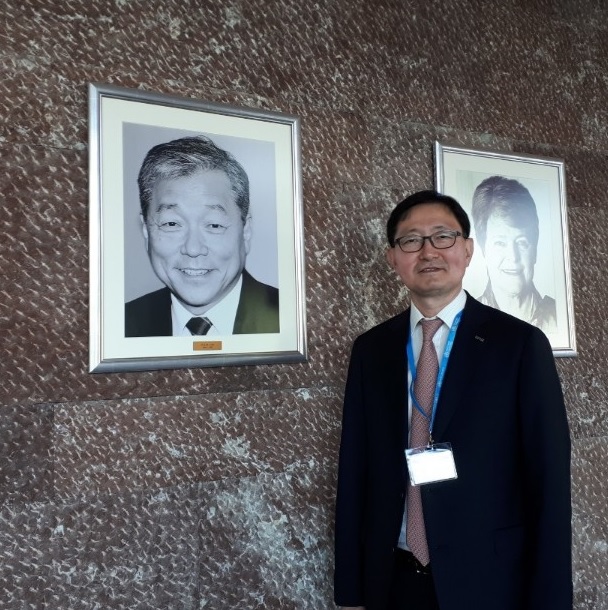Choo Moo-jin, President of the Korea Foundation for International Healthcare (KOFIH)
Every year around this time, when health ministers from around the world gather for the World Health Assembly, they almost always commemorate the late Lee Jong-wook, former director-general of the World Health Organization.
Even before he was elected to the office, Lee demonstrated his expertise and leadership to be called the “Czar of Vaccine” and “Man of Action” because he raised funds for the treatment and prevention of polio and HIV/AIDS, and provided related vaccines through global vaccine programs.
Unfortunately, he died of a brain hemorrhage on May 22, 2006, just before the 59th World Health Assembly.
Lee was the first Korean leader of an international organization. He was elected as the sixth director-general of the WHO through fierce competition in late January 2003, when Severe Acute Respiratory Syndrome (SARS), a new infectious disease, spread worldwide.
At the time, Lee said SARS was the first new disease of the 21st century, but it would not be the last. He vowed to enhance the WHO’s system and measures to warn and respond to new infectious disease outbreaks.
He created the Strategic Health Operations Center (SHOC) at the WHO headquarters for a global response to infectious diseases, despite difficult financial circumstances and lack of internal understanding. The center is the WHO’s control tower that plays a pivotal role in gathering information on infectious diseases around the world and establishing an immediate response strategy.
The gate of the SHOC has Lee’s name on it, and the center is called “War Room” or “JW Lee Center.” At this center, the incumbent WHO Director-General Tedros Adhanom Ghebreyesus is making a Covid-19 response strategy by collecting information on each nation’s situation and medical supplies in real-time.
When a new kind of avian influenza began to threaten global health after the SARS outbreak, Lee said in an interview with Japanese newspaper Mainichi Shimbun in April 2004 that it is only a matter of time before the new influenza pandemic, such as bird flu, spreads worldwide.
“After an outbreak of new influenza, it will require a huge cost. If we prepare in advance, however, we can prevent it with a small investment,” Lee said.
In an interview with a Korean media outlet in October 2005, he also warned that there would be a new kind of infectious disease.
“My warning is to make people aware of the dangers now so that people can prepare, even if I get criticized for fewer-than-expected victims. Countries and political leaders incapable of coping with the new infectious disease will find it impossible to take the rap,” he said.
The recent global spread of Covid-19 is claiming so many lives. However, Korea’s excellent response to the early spike of confirmed cases became a good model for other countries. Many nations, including the U.S., the U.K., France, Uzbekistan, Mongolia and Thailand, have requested Korea to share its Covid-19 experiences, or “Korea Covid19 Strategy.”
The government announced on April 26 that it would push to make the nation’s Covid-19 control model an international standard. On the following day, Seoul announced that it would provide over $400 million Economic Development Cooperation Fund (EDCF) to help developing countries fight Covid-19 within the year.

Besides, the government will utilize the Korea Covid19 Strategy model to pioneer a new market and enhance national status.
WHO chief Ghebreyesus requested President Moon Jae-in to give a keynote speech during the virtual meeting of the World Health Assembly in May. This is meaningful in several aspects.
First, as Ghebreyesus mentioned, the WHO appreciated Moon’s leadership during the Covid-19 crisis and shared the nation’s extensive strategies such as aggressive testing and tracing with world leaders.
Moon’s keynote speech will also be an opportunity for Korea to become a healthcare leader in the international community. Korea is the only country that transformed from a recipient of foreign aid to a provider of official development assistance (ODA) by joining the Development Assistance Committee (DAC) in 2010.
The keynote speech by Moon at the World Health Assembly will reinforce the importance of ODA in the public health sector and bilateral and multilateral cooperation.
Also, the foresight and leadership of the late Lee, who created the SHOC at the WHO headquarters, will shine again beyond time and space against new infectious diseases.
Lee’s calls for warning and preparedness for a new infectious disease have awakened people around the world. He will be remembered not only as a pioneer in Korea’s excellent response to new infectious diseases but also as an everlasting WHO director-general.
Even though Lee passed away, his commitment to public health continues to live through the Korea Foundation for International Healthcare (KOFIH).
KOFIH was established to improve public health in developing countries and North Korea and enhance the health of overseas Koreans and foreign workers in Korea through various ODA projects and Lee Jong-wook commemorative projects.
The WHO and the Korean government established “Dr. Lee Jong-Wook Memorial Prize for Public Health” in 2009. Every year, each country recommends a person or an organization that contributed to global health, and the KOFIH awards the prize.
This year, the 12th recipient was awarded Dr. Lee Jong-Wook Memorial Prize for Public Health, which has become one of the most prestigious awards by the WHO. The prize will become one of the most coveted awards for those who contribute to a healthier world.

